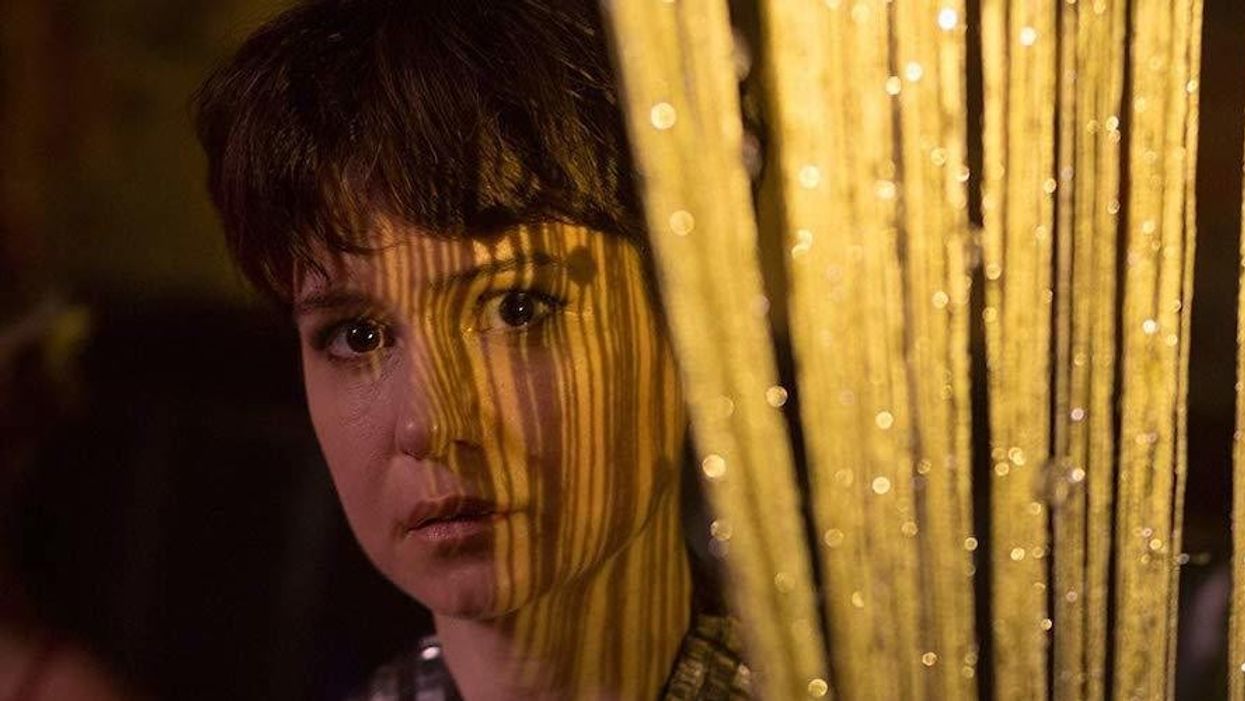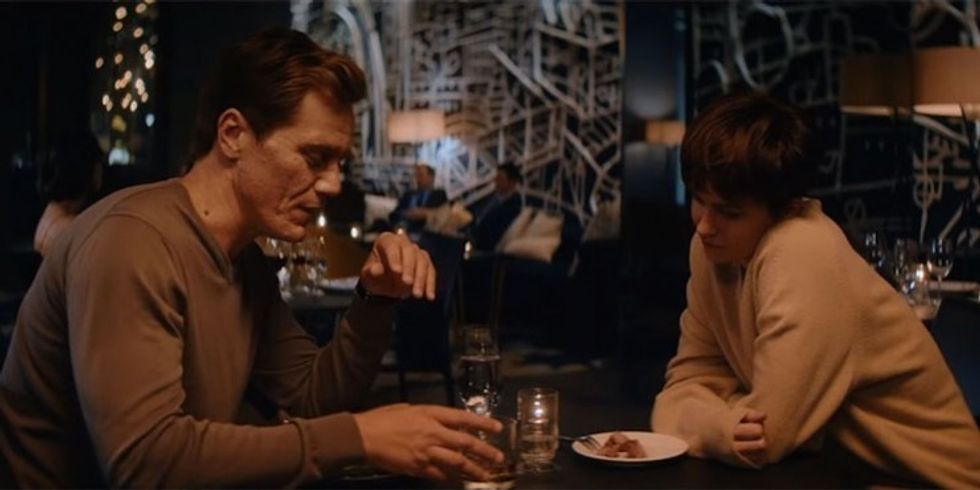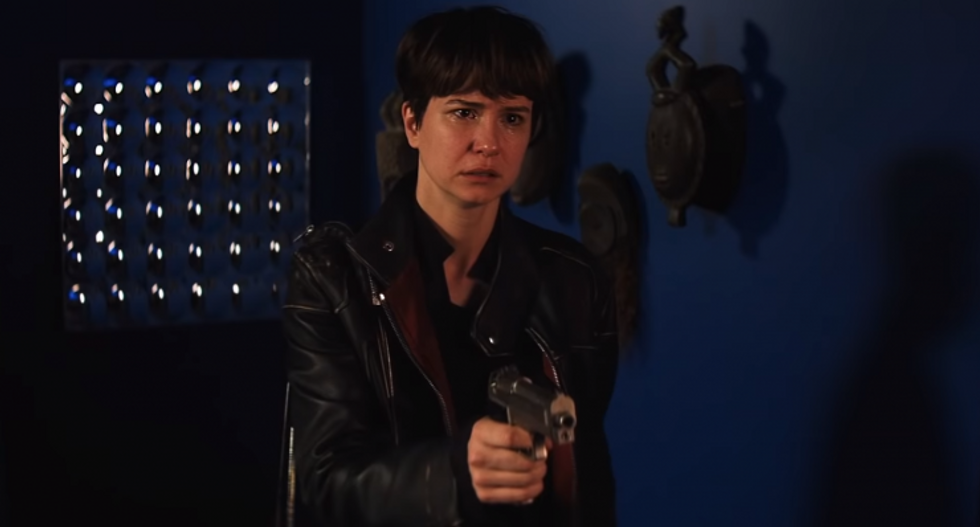'The Movie Gets Made in the Edit': Director Meredith Danluck on 'State Like Sleep'
Meredith Danluck's 'State Like Sleep' evolved as the actors and the director lived with the script.

Meredith Danluck's State Like Sleep is a small, personal, beautifully nuanced film about huge, ravaging, uncontrollable subjects. It opens with a death, as Katherine (played with edgy grace by Katherine Waterston) finds her husband Stefan's dead body in their apartment in Brussels.
There will be more death and violence in the film, but the interesting thing about the way it plays out is that you don't feel particularly weighed down by it because you, as a viewer, are too wrapped up in finding out about the particularities and dimensions of Katherine's life. She is the focus of the film, though the characters surrounding her, most notably business traveler Edward (Michael Shannon), who stays in the same hotel Katherine does, one year after Stefan's death, when she goes to intercept her mother (Mary Kay Place), who has gone to clean up the couple's apartment and ended up in the hospital. Katherine vacated the apartment, and the scenes inside it, like the rest of the film, have an eerie glow to them.
The exchanges between Waterston and Shannon are as charged and genuine as those between Waterston and Place are believably tense and loving at once. And the portrayal of the Brussels club scene here is loud, frightening, sort of like the inside of someone's mind.
As the film premieres in theaters, No Film School spoke with director Meredith Danluck about how the film evolved and shaped itself.
No Film School: I was curious about how you moved from making a more serious, experimental installation type feature to a more traditionally narrative film? What led you to make that leap?
Meredith Danluck: The experimental installation I did at Sundance in 2013 was a very conventional narrative structure for four screens simultaneously. It was very experimental in its context, but very conventional in its content. It had very, very typical characters and typical plot lines, and I had an amazing time working on it. When I finished that, I was just convinced that the next thing I wanted to do was what I kept referring to as a "normal movie." Film, though, is still such a new medium. When you compare it to something like painting or music, all of a sudden you realize, oh, film's only been around for 100+ years.
NFS: One question I have about the story itself is that Katherine's character seemed to have a sort of gaping need. She really needed fulfillment of different kinds, and I was wondering if that was because of her personality or if it was strictly brought on by the loss of her husband and then, subsequently, the loss of her mother.
Danluck: Yeah, it's so interesting to see how actors breathe life into what's on the page, because it's one thing on the page and then it completely transforms into this three-dimensional world. And when you have an actor like Katherine Waterston, you're bringing so much depth to what's on the page. The longing, and the want for some kind of reconciliation, some sort of understanding of her predicament...she brought a kind of urgency that really gave the film its motor.
NFS: And when Michael Shannon's character comes into the room, he seems very spontaneous. I was curious as to what you envisioned his role in the film to be.
Danluck: There are so many things in this story that are analogous to the feelings of isolation, loneliness, longing. And Brussels itself is this very beautiful but cold city that feels very isolating, and a lot of people are there just for business, eating dinner alone. Michael Shannon's role was really to be another person who was experiencing his own kind of trauma. We don't go into it in the film, but Katherine sees him as a safe space because they're not asking anything of each other. They open up and are able to be vulnerable in a way that they aren't able to be vulnerable with anybody else.
NFS: I was also wondering, how you chose the location for the hotel itself and for Katherine’s ex-husband’s apartment.
Danluck: When we visualize Europe as Americans, we think of antiquity. Really, though, a huge portion of Europe embraces design and a kind of sleek, modernist aesthetic. And so, in Belgium, I really found that to be true, much like in Scandinavia. So, for the hotel, I knew I wanted something that felt like the building perhaps was old, but the interior had been reimagined with a kind of modernist or postmodernist vision.
And as for the apartment, I lived right outside Brussels for a couple of years with a boyfriend, and he was a big collector of furniture and design. I basically wanted to recreate his apartment, because it was so specific and it had such an interesting look. It really felt like there was a person making decisions behind every object in the room. And that's what gives a feeling of authenticity to anything, really, is that someone has chosen everything over time, not just thrown some things from IKEA into a room to make it look full. Someone with opinions lives here.
When you compare film to something like painting or music, all of a sudden you realize, oh, film's only been around for a hundred years.
NFS: Given that the film takes place at two different times, how did you handle that logistically? Did you film all of the scenes that were from one time period at one time, and then all the scenes from another time period at another?
Danluck: I wish we had filmed everything in that kind of sweet sequence. My God. It would have been a lot easier. No, we really were, as in most productions, slaves to location availability. There was overlap in those different locations. In the loft, she's in the present-day, and she's also in the past. At the script level, there was always a delineation of how in the past her hair is long, and in the present her hair is short. And that was also something that operated deep within the character. In the past, she embraced femininity, less so in the present. Her hair is short, and she is almost trying to make herself invisible, wearing these baggy clothes. When she finally does go to the club, she wants something, so she's using her body, in a way. It was logistically very challenging because anybody's who's ever worked with wigs knows that they're very hard to get right. They take a long time.
"I always refer to the process of writing a script as being like one of those wishing wells where you throw a coin in and it starts going around in a big circle, and then eventually goes down through this little hole."
NFS: I was curious about what kind of discussions you had about her character and how it was to be played exactly.
Danluck: She was the second person to read the script ever. It was a very, very, very early draft, obviously. We had a friend in common, and he passed her the script, because she had just been cast in Inherent Vice, and he said, "She's gonna be a movie star." And so I would send her other drafts, and she and her team were tracking the project. And so, we had time to live with that character for years. She was able to read multiple drafts and really understand who that character was at a very, very deep level.
I think that kind of gestation process for an actor adds so much dimension, to the point where you know where you are emotionally in the script, instinctually or instinctively. There were moments onset where we would have little conversations in-between takes of how to edge the emotion one way or another. But I think for her, the real work came just over the course of those years of knowing the script and living with the script.
NFS: You mentioned that you had to work through it for a long time. How many times did the script change before you started shooting?
Danluck: It changed a lot from the first draft to the production draft. Absolutely. The ideas got refined. I always refer to the process of writing a script as being like one of those wishing wells where you throw a coin in and it starts going around in a big circle, and then eventually goes down through this little hole. It starts with a very broad idea, and gets more and more focused. And so, the script had many, many different iterations, but I didn't change the script during production. I didn't work on the script at all. I felt very confident in it. And then, during the edit, we lost some scenes, for time. And it's really true that the movie gets made in the edit.













